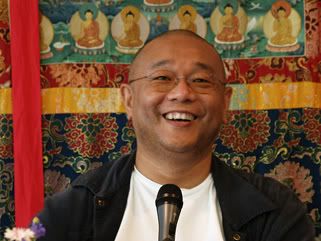Why Did The Buddha Teach? Part 3
Voici le troisième de quatre articles reprenant (en anglais) les réponses que donna en 2002 Jigmé Khyentsé Rinpoché à Sandra Scales, pour le livre qu'elle préparait à propos des Maîtres Nyingmapas du bouddhisme tibétain... texte reproduit avec l'autorisation de J. Kh. Rinpoché.
Read the first part of this text
Part 3 :
We are torn between such likes and dislikes. Like wild animals or canibals, our emotions eat our happiness away. We are constantlyhaunted by the fear of not having what we want or getting what we don't want. If we don't manage to discipline our minds and guard them from distraction, experiencing these wild emotions is our only alternative.
Sometimes we equate happiness with having the freedom to express our emotions.
Yes, and we tend to think we are freely expressive, free-thinking individuals, but how free are we really? If we have the freedom to be happy, then why aren't we?
Are you happy, Rinpoche?
I have every reason to be happy, but actually whether or not I am happy depends upon this thing called "me", my mind. And if this mind will not stay calm for even one instant, how can I be happy and free from disturbing emotions? Again, if we grasp this mind for a few moments - not the "nature of mind", just our daily mind - and not fall prey to publicists and marketing strategists and so on, then freedom and happiness may be possible.
Go on to part 4
* * *
Read also (in french) teachings on the "nature of mind" by Dilgo Khyentse Rinpoche.

